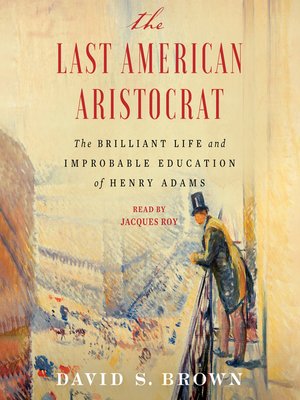The Last American Aristocrat
audiobook (Unabridged) ∣ The Brilliant Life and Improbable Education of Henry Adams
By David S. Brown

Sign up to save your library
With an OverDrive account, you can save your favorite libraries for at-a-glance information about availability. Find out more about OverDrive accounts.
Find this title in Libby, the library reading app by OverDrive.



Search for a digital library with this title
Title found at these libraries:
| Library Name | Distance |
|---|---|
| Loading... |
A "marvelous...compelling" (The New York Times Book Review) biography of literary icon Henry Adams—one of America's most prominent writers and intellectuals, who witnessed and contributed to the United States' dramatic transition from a colonial society to a modern nation.
Henry Adams is perhaps the most eclectic, accomplished, and important American writer of his time. His autobiography and modern classic The Education of Henry Adams was widely considered one of the best English-language nonfiction books of the 20th century. The last member of his distinguished family—after great-grandfather John Adams, and grandfather John Quincy Adams—to gain national attention, he is remembered today as an historian, a political commentator, and a memoirist.
Now, historian David Brown sheds light on the brilliant yet under-celebrated life of this major American intellectual. Adams not only lived through the Civil War and the Industrial Revolution but he met Abraham Lincoln, bowed before Queen Victoria, and counted Secretary of State John Hay, Senator Henry Cabot Lodge, and President Theodore Roosevelt as friends and neighbors. His observations of these powerful men and their policies in his private letters provide a penetrating assessment of Gilded Age America on the cusp of the modern era.
"Thoroughly researched and gracefully written" (The Wall Street Journal), The Last American Aristocrat details Adams's relationships with his wife (Marian "Clover" Hooper) and, following her suicide, Elizabeth Cameron, the young wife of a senator and part of the famous Sherman clan from Ohio. Henry Adams's letters—thousands of them—demonstrate his struggles with depression, familial expectations, and reconciling with his unwanted widower's existence.
Offering a fresh window on nineteenth century US history, as well as a more "modern" and "human" Henry Adams than ever before, The Last American Aristocrat is a "standout portrait of the man and his era" (Publishers Weekly, starred review).
Henry Adams is perhaps the most eclectic, accomplished, and important American writer of his time. His autobiography and modern classic The Education of Henry Adams was widely considered one of the best English-language nonfiction books of the 20th century. The last member of his distinguished family—after great-grandfather John Adams, and grandfather John Quincy Adams—to gain national attention, he is remembered today as an historian, a political commentator, and a memoirist.
Now, historian David Brown sheds light on the brilliant yet under-celebrated life of this major American intellectual. Adams not only lived through the Civil War and the Industrial Revolution but he met Abraham Lincoln, bowed before Queen Victoria, and counted Secretary of State John Hay, Senator Henry Cabot Lodge, and President Theodore Roosevelt as friends and neighbors. His observations of these powerful men and their policies in his private letters provide a penetrating assessment of Gilded Age America on the cusp of the modern era.
"Thoroughly researched and gracefully written" (The Wall Street Journal), The Last American Aristocrat details Adams's relationships with his wife (Marian "Clover" Hooper) and, following her suicide, Elizabeth Cameron, the young wife of a senator and part of the famous Sherman clan from Ohio. Henry Adams's letters—thousands of them—demonstrate his struggles with depression, familial expectations, and reconciling with his unwanted widower's existence.
Offering a fresh window on nineteenth century US history, as well as a more "modern" and "human" Henry Adams than ever before, The Last American Aristocrat is a "standout portrait of the man and his era" (Publishers Weekly, starred review).







